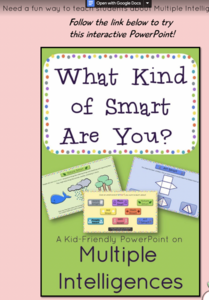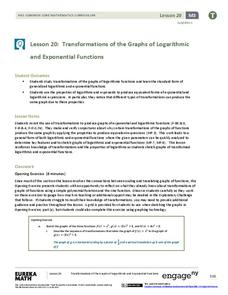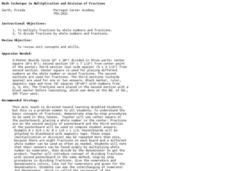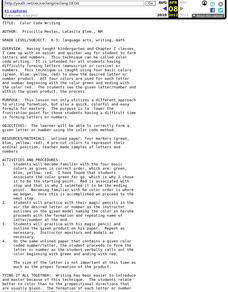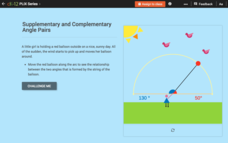Curated OER
Counting Exercise
In this counting numbers from one to five worksheet, learners color the large numbers according to the color code provided. Students color five numbers.
CK-12 Foundation
Fundamental Trigonometric Identities: Tangent Identity
An identity that thieves can't steal the tangent identity. Scholars manipulate ratios to investigate the tangent ratio and connect it to the sine and cosine ratios. An interactive that uses color coding helps with this task.
Teachers Pay Teachers
What Kind of Smart Are You
Gain insight into the type of learners that fill your classroom. An eight-question survey asks scholars questions about themselves. Using their color-coded answers, they conclude their degree of intelligence in multiple areas—music,...
Differentiation Central
Perimeter and Area
Leave no student behind with this differentiated geometry unit on perimeter and area. Over the course of five lessons, young mathematicians explore these foundational concepts through a series of self-selected hands-on activities and...
EngageNY
Transformations of the Graphs of Logarithmic and Exponential Functions
Transform your lesson plan on transformations. Scholars investigate transformations, with particular emphasis on translations and dilations of the graphs of logarithmic and exponential functions. As part of this investigation, they...
EngageNY
Solving Exponential Equations
Use the resource to teach methods for solving exponential equations. Scholars solve exponential equations using logarithms in the twenty-fifth installment of a 35-part module. Equations of the form ab^(ct) = d and f(x) = g(x) are...
EngageNY
Matrix Notation Encompasses New Transformations!
Class members make a real connection to matrices in the 25th part of a series of 32 by looking at the identity matrix and making the connection to the multiplicative identity in the real numbers. Pupils explore different...
Youthlinc
Financial Literacy: Money Attitudes Lesson Plan
Going once, going twice, sold! An auction provides class members with an opportunity to examine their attitudes toward money. After bidding on and purchasing items, individuals complete an attitude survey and then identify a...
Curated OER
Caps for Sale/Color Words
Students read the book "Caps for Sale." Students model reading a sentence and using one color cap and the color word (written in its color). They match the color word (written in its color) to the correct color hat.
Curated OER
U.S. States: The Western States
In this addition worksheet, students solve 11 addition math problems found in the western states of the United States of America. Students follow the key and color code each state by its sums.
Curated OER
Addition of Shapes
In this addition activity, students count, write and add together 6 sets of different color-coded shapes in the boxes provided. Students totals will average between 10 and 18.
Curated OER
Cleopatra
In this addition worksheet, students solve 10 addition math problems within a picture of Cleopatra and then follow the color chart to color in each answer a specific color.
Curated OER
Math Technique in Multiplication and Division of Fractions
Students multiply and divide fractions. In this math lesson, students are given explicit visual instruction of how to work with fractions. Intended for learning disabled students, the teacher demonstrates how to manipulate the numbers by...
Curated OER
Color Code Writing
Pupils form letters and numbers using a technique called color code writing.
K-5 Math Teaching Resources
Fraction Strips
Reach out to your visual and kinesthetic learners with this set of printable fraction strips. Not only is this resource a great way to develop children's fractional number sense, it's bound to capture their engagement as well.
CK-12 Foundation
Adding and Subtracting Matrices: The Matrix Calculator
Discover the procedure to add and subtract matrices. Pupils use the interactive and discover the pattern in adding and subtracting matrices. Scholars adjust the entries in the addends and see the resulting changes in the sum. They also...
CK-12 Foundation
Radical Equations: Geometric Visual of a Square Root
How can you draw a number? A set of questions takes learners through the reasoning for why a geometric construction can be drawn to represent the square root of a number. An interactive helps visualize the construction.
CK-12 Foundation
Ordered Pairs in Four Quadrants
One quadrant just isn't enough. Pupils learn to plot points in the four quadrants of a coordinate plane using an interactive. A set of challenge questions tests their understanding of the skill.
CK-12 Foundation
Systems of Linear Inequalities: Baking Cookies
Cook up a good resource for systems of linear inequalities. Using an interactive, individuals graph a system of linear inequalities to represent constraints on the number of cookies a person must bake. A set of challenge questions...
CK-12 Foundation
Supplementary Angles: Spiderweb Angles
The itsy, bitsy spider went up the virtual wall. An interactive allows users to change the angles in a spider web. They must attend to supplementary angles as they answer challenge questions throughout the interactive.
CK-12 Foundation
Supplementary and Complementary Angle Pairs
Complement and supplement your knowledge of angles. Young mathematicians study supplementary and complementary angle pairs using an interactive. A set of challenge questions solidifies this understanding.
CK-12 Foundation
Identify Line Types: Identify Types of Lines
If lines aren't parallel or perpendicular, then what are they? An interactive lets users rotate a line to change its orientation
with respect to another line. It then indicates whether the
lines are parallel, perpendicular, or...
CK-12 Foundation
Parallel and Perpendicular Lines: Identify Types of Lines
Are there only three options: parallel, perpendicular, or intersecting? Scholars move a given line in an interactive to change its orientation with respect to another line. The interactive indicates whether the lines are parallel,...
CK-12 Foundation
Proofs: Angle Pairs and Segments—The Three Angle Problem
Finding the sum of the measures of three angles is easy, unless you have no clue what the measures are. Learners use an interactive diagram to see a geometric problem in a different way. A set of challenge questions takes them through...




